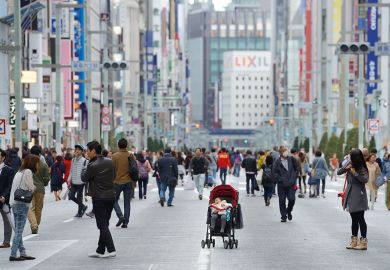Australia’s top-ranked university says it is fulfilling its pledge to reduce casualisation, but employee representatives claim it is shedding staff – and foisting more work onto the survivors – under cover of proposed international student caps.
Casual arts academics at the University of Melbourne have been told that they will share just 5 per cent of their faculty’s salary budget next year, down from 8 per cent this year and 24 per cent at the beginning of the coronavirus pandemic.
They have also heard that the faculty’s earnings will fall by about A$3 million (£1.5 million) next year after rising by A$40 million in 2024. The prediction reflects Melbourne’s proposed overseas enrolment cap, which would reduce international student commencements by 15 per cent and cut anticipated institutional revenue by A$85 million next year.
The university also plans to return to a “break- even position” in 2025 after running considerable operating deficits over the past three years. Administrators want to achieve operating surpluses of around A$40 million a year from 2026.
Sessional academics blame Melbourne’s financial pressures for a recruitment freeze, with next year’s jobs yet to be advertised. Staff who have worked casually at the arts faculty for many years are fearful of losing their livelihoods.
A Melbourne spokeswoman said the university was “successfully increasing secure employment and reducing the employment of casual staff and the use of short-term fixed-term contracts”.
She said the casual proportion of Melbourne’s full-time equivalent staff had been reduced from 16 per cent in late 2019 to 10 per cent by the end of 2023, reflecting a decline of almost 30 per cent in casual staff numbers. “We have consistently said that an overreliance on casual employment is neither desirable nor sustainable.”
Times Higher Education asked whether the university would appoint staff permanently to compensate for the decline in casual academic numbers. “We cannot confirm how many additional appointments will be made across the university in the future,” Melbourne’s spokeswoman said.
The National Tertiary Education Union (NTEU) says Melbourne has signalled that there will be “no funding” for sessional staff in 2025. The union says the proposed international student caps were “providing a convenient justification for universities to downsize and shift more workload onto fewer staff – plans many institutions were already considering”.
The NTEU has scheduled an online meeting to discuss job cuts across the sector. “During the pandemic, despite record profits, universities still made significant jobs cuts and increased workloads,” the union said. “Now, international student caps are being used to justify similar actions. This isn’t just about responding to government policy; it’s about organisational priorities.”
In an email to staff, Melbourne provost Nicola Phillips and chief operating officer Katerina Kapobassis acknowledged the caps’ “unsettling” impacts. They say the university has taken “common-sense” steps such as reducing discretionary spending and pausing non-essential recruitment.
“We will not be introducing any other university-wide measures until we have a better understanding of the full financial impact of the proposed cap,” the email says. “For now, we will take a careful, prudent approach to managing our finances…just as we did during the pandemic.”
Melbourne is offering permanent employment to casual staff who meet strict criteria. They include doing enough casual work to earn at least 40 per cent of an equivalent permanent academic’s salary for each of the preceding three years.




